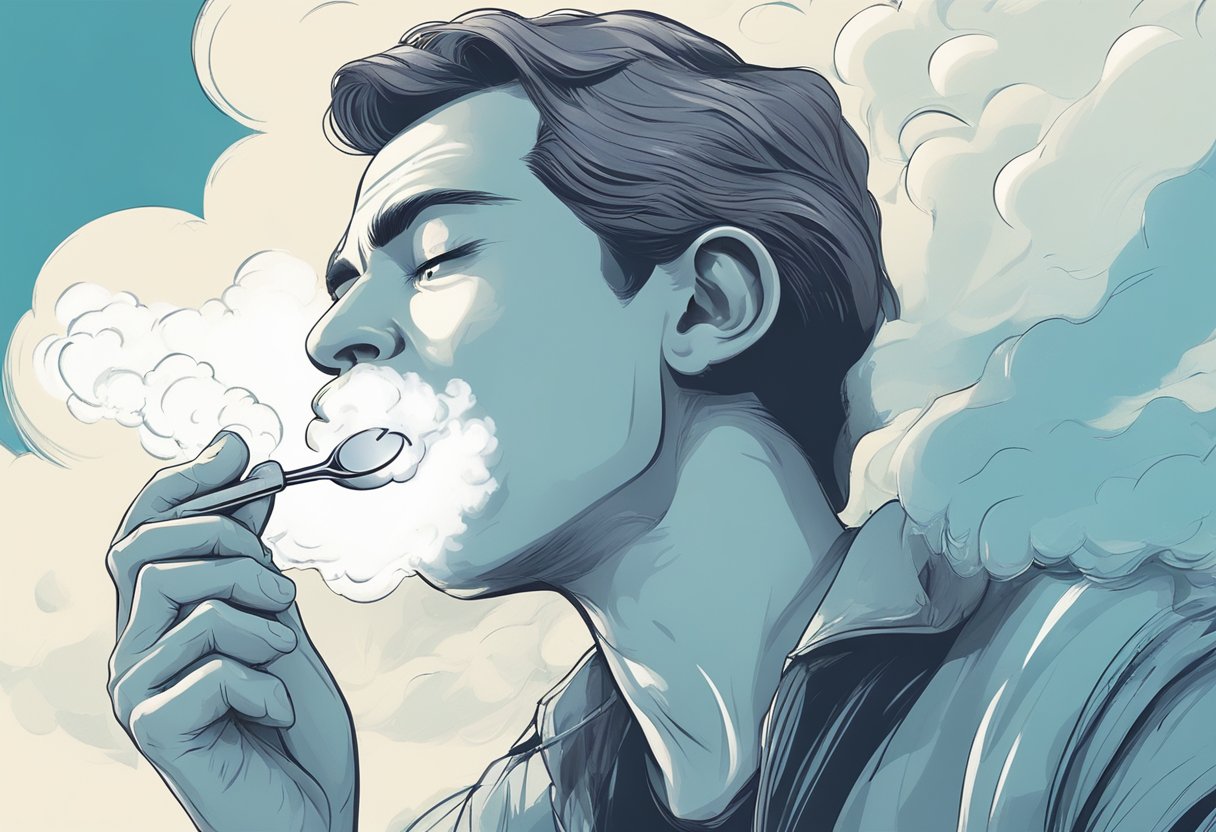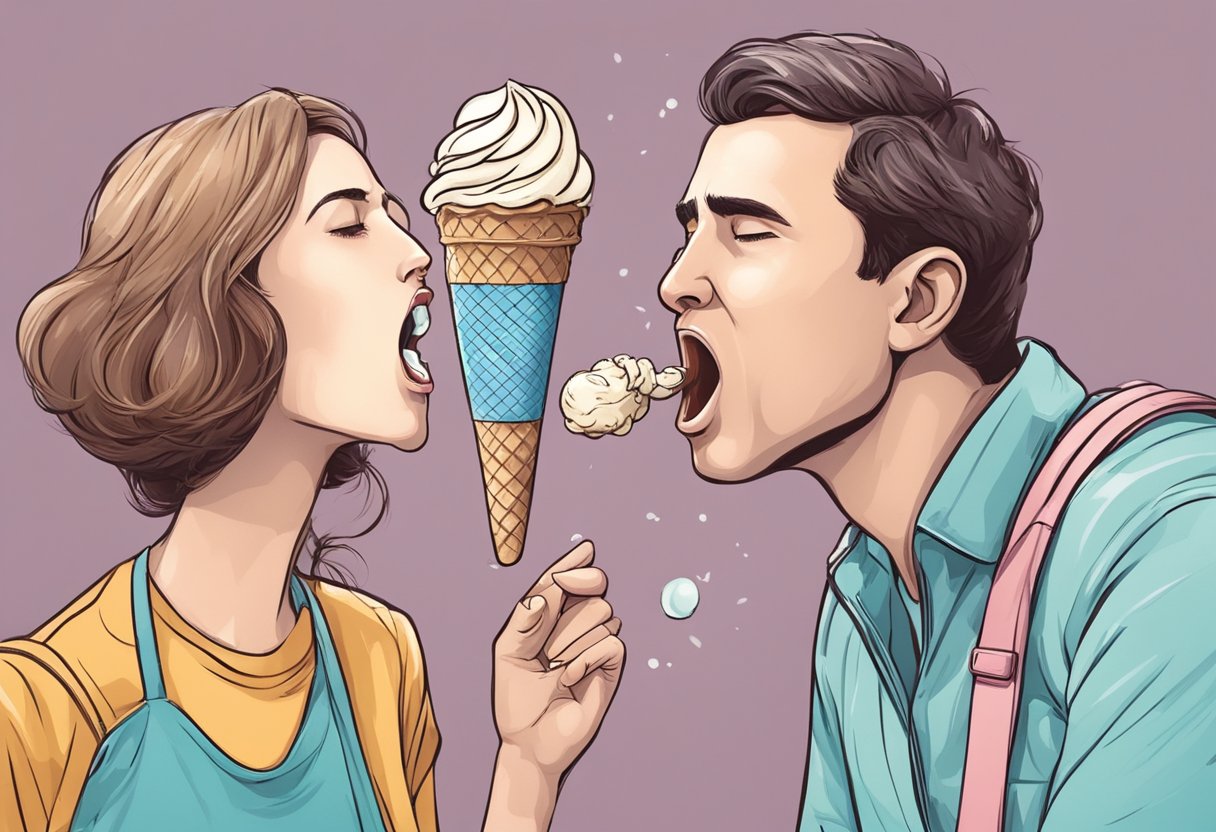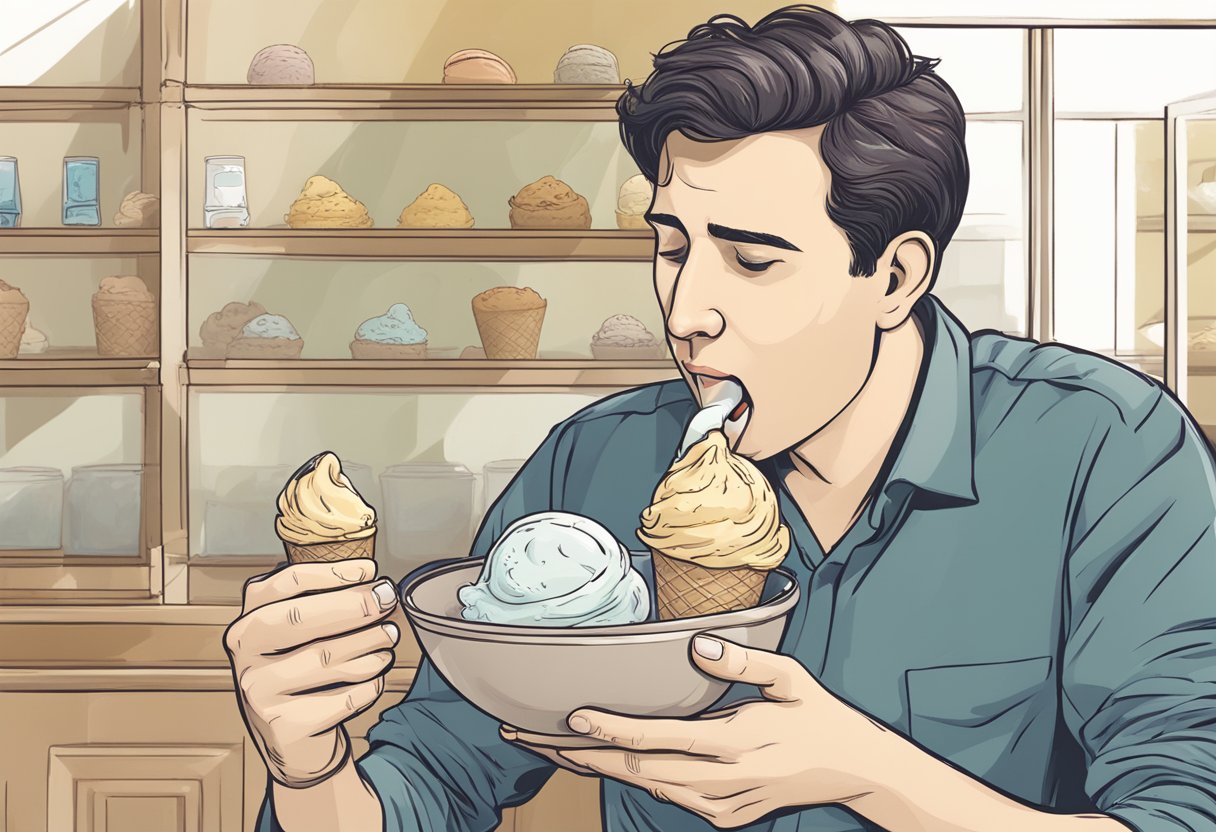Have you ever wondered why you cough after enjoying a scoop of ice cream? You’re not alone. Many people experience this phenomenon and are curious about the reasons behind it. Coughing after eating ice cream can be related to various factors, such as temperature sensitivity, allergies, or medical conditions.

When indulging in cold treats, it’s important to consider how our body reacts to certain temperatures and conditions. In some cases, the coldness of ice cream can cause our airways to constrict, making it difficult to breathe and leading to coughing. Additionally, some individuals might be susceptible to allergies or intolerances, causing reactions when consuming specific ingredients found in ice cream.
Understanding the relationship between ice cream and coughing can help alleviate this discomfort and allow you to enjoy your favorite treat without fear of a coughing fit. By recognizing the potential causes and considering remedial measures, you’re one step closer to conquering that annoying post-ice cream cough.
Key Takeaways
- Cold temperatures in ice cream can cause airway constriction, leading to coughing.
- Allergies or intolerances might trigger coughing after consuming certain ice cream ingredients.
- Awareness of underlying causes can help individuals manage and prevent coughing episodes.
The Mechanics of Coughing

Coughing is a natural reflex that helps protect the airways and lungs by removing irritants and clearing mucus. It occurs when the muscles in the chest and abdomen contract forcefully, expelling air from the lungs and pushing it through the trachea. This forceful expulsion of air can dislodge mucus, phlegm, and other contaminants to clear the airway.
When a person consumes cold foods like ice cream, it can sometimes lead to coughing. This is often due to the cooling effect on the throat, which may cause the muscles and mucus in the airways to contract or harden. As a result, the body initiates a cough to clear the restricted airways and ensure proper breathing.
Another factor contributing to coughing after consuming ice cream is the presence of dairy. Dairy products are known to increase mucus production in some individuals, leading to an increased amount of phlegm in the airways. This excess mucus can cause a sensation of irritation within the lungs and trachea, which may trigger a coughing reflex.
Cold temperatures can also cause bronchospasm, a condition where the muscles surrounding the airways contract and narrow, making breathing more difficult. This narrowing of the airways may result in coughing as the body works to open the restricted passageways for proper airflow.
Overall, coughing is a useful mechanism that the body employs to maintain clear, unobstructed airways, ensuring optimal breathing and lung function. While coughing after eating ice cream may be inconvenient, it is ultimately a sign that the body is working to protect itself from potential irritation and respiratory issues.
Ice Cream and Cold Temperatures’ Effect on Coughing

Ice cream is a favorite treat for many, but it can sometimes lead to coughing. The cold temperature of ice cream can cause irritation to the nerves in the digestive tract, prompting a coughing reflex. This reaction is not only limited to ice cream, as other cold foods and beverages like cold water can have a similar effect on the throat and airways. When consuming cold foods becomes uncomfortable, waiting for a few minutes to let it warm up slightly before eating can help reduce the chances of coughing.
For some individuals, inhaling cold air while eating ice cream can also trigger coughing. This is because cold air can cause constriction of the airways, leading to a condition called cold-induced asthma. Those who already have asthma or other respiratory conditions are more susceptible to this reaction, as their airways might already be inflamed or sensitive.
Another factor that may contribute to coughing after eating ice cream is the presence of allergens, such as dairy. In these cases, it is not the coldness of the ice cream that causes irritation, but rather an allergic reaction to the milk proteins. Swapping to a dairy-free alternative can potentially alleviate the issue for those who are lactose intolerant or have a dairy allergy.
In conclusion, coughing due to ice cream can be attributed to cold temperatures, cold-induced asthma, and allergens present in some ice creams. To minimize coughing from cold foods, let them warm up slightly before consuming, and always have a glass of warm water nearby to soothe the throat if necessary. Lastly, ensure that the ice cream consumed does not contain allergens that could cause an unwanted coughing fit.
Potential Allergies and Intolerances
https://youtu.be/beYnHDmODbg?si=EpoSl0RX0ywy9L78
Dairy Allergy and Lactose Intolerance
A common reason for coughing after consuming ice cream is an allergic reaction to dairy products, such as milk. A dairy allergy occurs when the immune system overreacts to the proteins found in milk, which triggers various symptoms like coughing, hives, swelling, and even anaphylaxis in severe cases. In contrast, lactose intolerance results from the body’s inability to break down lactose, a sugar found in milk and dairy products. Symptoms of lactose intolerance include diarrhea, vomiting, nausea, and abdominal pain, but usually do not involve coughing.
Additives, Sulfites, and Uncommon Triggers
Apart from dairy, ice cream may contain additives and sulfites that can cause allergic reactions in some individuals. These substances are often used as preservatives, flavor enhancers, or coloring agents. Additionally, there could be other triggers, such as pollen, dust, or smoke, which may find their way into the ice cream and cause discomfort. Monitoring which ingredients in ice cream cause reactions helps in identifying the actual allergen.
Testing for Allergies and Intolerances
If you suspect that eating ice cream causes you to cough or experience other symptoms, it is important to consult with a healthcare provider. A healthcare professional can perform an allergy test to determine if you have a food allergy or intolerance. They may recommend a skin prick test or blood test to help identify the specific allergen causing the symptoms. Seeking medical attention is crucial for proper diagnosis and management of allergies and intolerances.
Alternatives to Dairy-Based Ice Cream
For those who experience allergy or intolerance symptoms due to dairy-based ice creams, numerous alternatives can be considered for a refreshing treat. Almond milk, coconut milk, and soy-based ice creams are popular options that cater to dairy-sensitive individuals. These alternatives are lactose-free and may also be suitable for those with dairy allergies, depending on the ingredients involved.
Immediate Reactions After Eating Ice Cream

Ice cream can trigger several immediate reactions for some people after consumption. One common reaction is coughing after eating, which can be caused by factors such as allergies to the ingredients, cold-induced bronchospasm or sensitivity to sugar substitutes or certain food additives in the ice cream.
Allergies to dietary components like lactose, found in dairy products, could lead to coughing as the body reacts to the allergen. Symptoms may vary from person to person and can include chest tightness, shortness of breath, and difficulty breathing, alongside coughing. It is essential to consult a medical professional if symptoms persist or worsen over time.
Cold-induced bronchospasm occurs when the bronchial tubes in your lungs constrict in response to cold temperatures, such as the cold sensation of ice cream. This can lead to coughing, chest pain, and shortness of breath as the body tries to clear the airways. To minimize this reaction, try enjoying your ice cream slowly or in smaller bites to ease the cold sensation.
In some cases, reactions might arise from sugar substitutes or artificial flavors present in ice cream. Sugar substitutes like stevia can sometimes cause sensitivity and lead to coughing. Artificial flavors and other additives such as preservatives could also cause coughs and other respiratory discomfort.
It’s important to note that in rare instances, these reactions could lead to anaphylactic shock, a severe and life-threatening allergic response. Symptoms may include chest pain, sudden difficulty breathing, and feeling lightheaded. If you experience these symptoms, seek immediate medical attention.
Understanding the reasons behind these immediate reactions after eating ice cream will help in managing them appropriately. However, it is always recommended to consult with a healthcare professional if there are persistent or severe respiratory symptoms after consuming ice cream or any other food products.
Possible Underlying Medical Conditions

Asthma and Respiratory Infections
Individuals with asthma might experience coughing after consuming ice cream due to the cold temperature and potential allergens. Asthma is a respiratory condition that causes inflammation in the airways and can make them overly sensitive to irritants. Infections, such as bronchitis and other respiratory tract infections, can also cause coughing. Eating ice cream may irritate the throat, leading to further exacerbation of wheezing and coughing symptoms in people with asthma or infections.
GERD and Acid Reflux
Gastroesophageal Reflux Disease (GERD) is a chronic digestive condition where stomach acid or bile flows back up into the esophagus, causing a burning sensation. Consuming ice cream may trigger GERD symptoms because the high fat content can increase stomach acid production and cause backflow into the esophagus. This irritation of the esophagus and throat can contribute to coughing.
Acid reflux, a milder form of GERD, can also cause coughing after eating ice cream. When stomach acid reaches the throat, it might lead to irritation and coughing. Both GERD and acid reflux should be managed under a healthcare professional’s guidance to control symptoms and prevent complications.
Cold and Flu
Colds and flu are viral infections that commonly cause sore throats, congestion, and coughing. Bacterial infections, such as strep throat, may also lead to a cough. Consuming ice cream while having a cold or flu may irritate the throat further, prompting coughing and discomfort. The cold temperature of ice cream might also prolong the feeling of a sore throat. In such cases, it’s recommended to avoid ice cream and opt for soothing warm beverages or soft, non-irritating foods instead.
Potential Remedial Measures

Medication and Over-the-Counter Solutions
There are various medications that can help alleviate coughing after consuming ice cream. Antihistamines can be useful in reducing allergy-related symptoms, such as those associated with a dairy allergy or cold-food irritation. In some cases, over-the-counter cough suppressants or decongestants may help in reducing throat irritation. However, it is important to consult a healthcare professional before starting any new medication.
Natural Remedies
Several natural remedies can provide relief from coughing triggered by ice cream consumption:
- Honey: Honey is known for its soothing properties and can help alleviate throat irritation. It also possesses antibacterial qualities, which may aid in reducing inflammation.
- Ginger: Ginger has anti-inflammatory properties that can help soothe an irritated throat and reduce coughing.
- Hot water: Drinking hot water can help relax the throat muscles and alleviate coughing. Adding a spoonful of honey or ginger to the hot water can further enhance its soothing effects.
- Herbal tea: Herbal teas, such as chamomile or peppermint, can help soothe throat irritation and suppress coughing.
- Turmeric: Turmeric contains an active ingredient called curcumin, which has powerful anti-inflammatory properties. Adding a pinch of turmeric powder to a warm drink or meal can help reduce inflammation and soothe coughing.
Improvement of Environmental Conditions
Improving the environment in which you live or consume ice cream can go a long way in minimizing coughing episodes:
- Eucalyptus: The refreshing scent of eucalyptus can help reduce coughing by improving air quality and relieving congestion. Diffusing eucalyptus oil or using a eucalyptus-infused steam inhalation can be beneficial.
- Humidifier: Dry air can contribute to throat irritation, leading to coughing. Using a humidifier helps maintain optimal humidity levels in the environment, reducing the possibility of coughing episodes.
- Dust, smoke, and pollen reduction: Minimizing exposure to allergens like dust, smoke, and pollen can also help alleviate coughing after eating ice cream. Cleaning the living environment to reduce dust and avoiding exposure to smoke is important. For those with pollen allergies, it is advised to avoid consuming ice cream outdoors during peak pollen season.
When to Seek Medical Attention

While occasional coughing after eating ice cream may not be a cause for concern, there are instances where it is necessary to seek medical attention. If coughing becomes persistent, worsens over time, or is accompanied by other symptoms, it may indicate an underlying health issue that requires the expertise of a healthcare provider.
For those experiencing difficulty breathing, chest tightness, or wheezing in addition to coughing, it is essential to consult a healthcare provider as soon as possible. These symptoms may be signs of a more severe condition, such as asthma or chronic obstructive pulmonary disease (COPD). Prompt diagnosis and treatment are crucial to effectively manage these conditions and prevent complications.
Furthermore, individuals who suspect they may have a dairy allergy should speak to a healthcare provider. An allergy to dairy products or certain ice cream ingredients may cause coughing after consumption, as well as other symptoms like hives, nausea, or diarrhea. A healthcare provider can perform tests to determine the presence of an allergy and provide guidance on the necessary dietary changes and treatment.
In the case of infections like the common cold or sinusitis, healthcare providers can diagnose the issue and recommend medications or remedies to alleviate symptoms. Ensuring the appropriate treatment is received is vital in preventing the infection from worsening or leading to further complications.
In summary, if coughing after eating ice cream is accompanied by additional symptoms, persistent, or becoming increasingly troublesome, seeking medical attention is crucial in addressing any underlying health concerns and maintaining overall well-being.
Frequently Asked Questions

Why do cold foods trigger coughing?
Cold foods, like ice cream, can cause coughing because they can irritate the throat and airways. The sudden change in temperature from consuming a cold treat may cause the muscles in your airways to constrict, leading to coughing. Additionally, cold foods can increase mucus production, making the throat feel more irritated and congested.
Can ice cream worsen a cough?
Ice cream can potentially worsen a cough, especially if an individual has underlying conditions like asthma, allergies, or acid reflux. The dairy ingredients in ice cream may act as triggers for some people, causing an increase in mucus production and inflammation. Moreover, the cold temperature can further irritate an already sensitive throat and airways.
Is there a link between dairy and coughing?
There can be a link between dairy products, like ice cream, and coughing for some individuals. Milk and other dairy products can cause your body to produce more mucus, leading to increased mucus thickness and potential coughing. People with lactose intolerance, allergies, or sensitivities to dairy might also experience coughing as a reaction to these products.
Does ice cream affect throat sensitivity?
Yes, ice cream can affect throat sensitivity due to its cold temperature. The cold sensation can cause your throat and airways to tighten, resulting in a tickling sensation or irritation, prompting a cough. Additionally, if someone has an existing throat irritation or infection, consuming ice cream may exacerbate the issue.
Are coughs common after consuming frozen treats?
Coughs can be common after consuming frozen treats, particularly for individuals with sensitivities to cold temperatures, pre-existing conditions, or those with allergies to the ingredients present in the treats. The cold temperature, dairy content, and possible allergens contained in frozen desserts can all contribute to coughing for susceptible individuals.
Can ice cream cause throat irritation?
Ice cream can cause throat irritation due to a combination of cold temperature and potential allergens. The cold temperature may irritate the throat and airways, leading to a sore or itchy feeling that triggers a cough. Additionally, the dairy ingredients present in most ice creams can potentially cause throat irritation and inflammation for those with allergies, intolerance, or sensitivities to these ingredients.
- Why is My Poop Black: Uncovering the Causes and Solutions - December 21, 2023
- Clear Protein Drinks: Optimal Hydration and Muscle Support for Athletes and Fitness Enthusiasts - December 21, 2023
- Does Apple Juice Make You Poop: Uncovering the Digestive Effects - November 29, 2023








